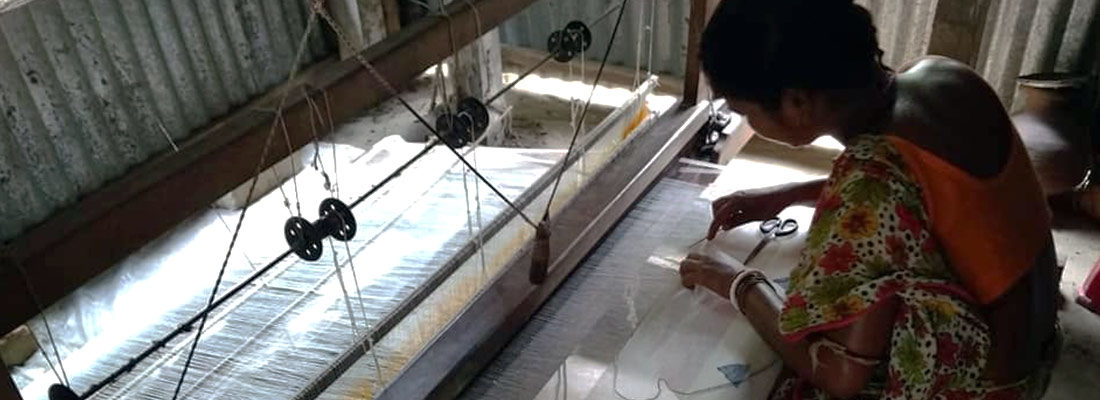


Date : Jul 23 , 2019 | Alumni
Arundhati Maitra’s engagement with social development started with sporadic acts of giving money but has evolved over the years as a result of her efforts to build deeper relationships with the communities she works with. Today, the ILSS alumna runs an initiative that combines her interest in traditional textiles and crafts with her passion for sustainable change.
I consider myself blessed to have been brought up in a liberal, unorthodox environment. The seeds of my social conscience were sown early on and have remained with me since then. As I grew up, I found myself following in my father’s footsteps by stepping into the world of student activism – fighting not just for the rights of students, but also for those of the underprivileged and marginalised.
My involvement in social work was quite random until 2015, when a chance meeting with an acclaimed author changed my life forever. Until then I was happy sponsoring the education of a girl child I had never seen and doing other sporadic acts of funding. Gradually, a discontent was setting in. I found myself itching to do more than just give money.
Partnering for good
A rather long quest to find a social welfare organisation with whom I could actively engage led me to this author, who introduced me to a grassroots organisation working primarily with scheduled castes and scheduled tribes in the remote corners of Bengal and Jharkhand.
With operational support from this organisation I started a non-formal primary education centre for school-going children in Bandarberia, a tribal village on the Bengal-Jharkhand border.
After two-three successive visits I realised that the villagers had to grapple with larger challenges – water scarcity, absence of electricity, sanitation, and so on. Through personal initiative and with help from some Good Samaritans, I was partially able to address two most basic needs – water and electricity. In collaboration with an NGO we got two tribal villages electrified with solar powered streetlights. This project was executed against unforeseeable odds and tested my project management skills to the fullest. At the end, the villages got electricity and we got our reward of smiling faces.
Finding direction
During my frequent trips to rural Jharkhand and Bengal I would visit new villages and meet new people, trying to understand their society, their customs, their challenges. Some of these were life-altering experiences. I realised just how privileged we were, and that disturbed me immensely.
Given my deep interest in folk music, crafts and textiles, I tried to dig into their culture to see if and how traditional crafts were being practised. Never in my wildest dreams did I imagine at that time that this academic interest would translate into an active engagement with the eco-system.
As I was looking around for a formal induction into the social sector, I chanced upon India Leaders for Social Sector (ILSS) and the ILSS Leadership Program, which is designed precisely for people like me who are looking for a meaningful engagement with the social sector. The 9-day program was deeply immersive and experiential. When I think back of all the stalwarts in the sector we met and interacted with, I feel humbled and honoured.
Post-ILSS the desire to get into the sector was sky high. I just wanted to go out there and do something useful. And I felt most drawn towards rural development.
Finding purpose
Due to circumstances beyond my circle of influence I have not yet managed to immerse myself in the social sector completely. However, I have been on the path of exploration. By sheer chance I discovered a delightful way of engagement that addresses many of my interest areas. As an ardent admirer of the rich heritage of Indian textiles, I decided to do my bit to revive handloom weaving.
The vast repository of knowledge and experience of India’s handloom weavers is at stake today due to the onslaught of power looms and the lack of organised institutional support for handlooms. Also, traditional weavers are moving away to other professions in search of ‘better’ livelihoods. Every day we are losing a part of our heritage.
From this germinated the idea of Aasmani By Arundhati – my little creative venture. At Aasmani we are working closely with skilled handloom weavers across rural Bengal to create textiles that are natural and sustainable. We love to experiment with natural fibres and natural dyes, and the response has been encouraging. We ensure fair wages to the weavers, as they hold the key to our success.
Being an optimistic person, I feel the future is bright, if only we do our own little bit for the world. In India the problems are manifold. But where there is a problem, there is also a solution. We just have to look for it at the right place!
Date : Jul 4 , 2024
Date : Jun 27 , 2024
Date : Jun 15 , 2024
Date : Apr 5 , 2024
Date : Mar 28 , 2024
Date : Jan 25 , 2024
Date : Mar 22 , 2023
Date : Mar 15 , 2022